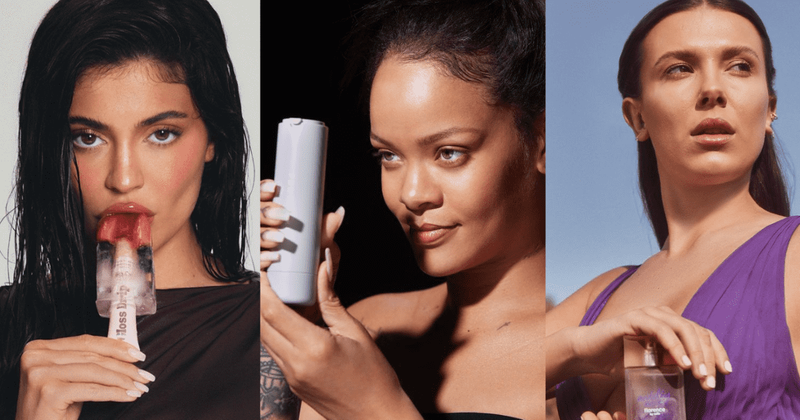
The intersection of celebrity culture and the beauty industry is a dynamic space, filled with innovation, entrepreneurship, and influence. In recent years, celebrities have leveraged their star power and personal brands to launch beauty products that captivate audiences worldwide. In this comprehensive article, we will explore the intriguing world of celebrity beauty products, examining the driving forces behind this trend, the key players, and the impact they have on the industry.
The Rise of Celebrity Beauty Brands
In recent years, the beauty industry has experienced a transformative shift. Traditionally, celebrities were primarily used as endorsers and faces of established beauty brands. However, the landscape has evolved, with an increasing number of celebrities becoming entrepreneurs in their own right. This transformation can be attributed to several factors:
1. Personal Branding
The power of personal branding is a defining element in the rise of celebrity beauty brands. Celebrities, particularly in the age of social media, recognise the potency of their personal brands. With millions of followers on platforms like Instagram, Twitter, and TikTok, they have a direct and immediate connection with their fan base. This unique connection allows for a more intimate and authentic relationship between celebrities and their consumers.
Consumers are not just buying a product; they are buying into a lifestyle, a persona, and a vision represented by the celebrity. This personal connection is a driving force behind the immense success of celebrity beauty brands.
2. Entrepreneurial Spirit
Many celebrities have displayed remarkable entrepreneurial ambition, seeking to expand their ventures beyond the entertainment industry. They are driven by a desire to diversify their portfolios and enter industries where they are genuinely passionate and knowledgeable. This passion translates into the quality and authenticity of their beauty brands.
For instance, Rihanna’s journey with Fenty Beauty was inspired by her personal frustration with the lack of inclusivity in the beauty industry. This dissatisfaction fueled her entrepreneurial spirit and drove her to create a brand that resonates with individuals of all skin tones and backgrounds.
3. Market Demand
The demand for celebrity-endorsed and celebrity-created products has been on the rise. Consumers are eager to have a piece of the celebrity lifestyle, and beauty products provide a relatively accessible entry point. The trust and admiration that fans have for their favourite celebrities often translate into significant sales. Celebrities, in essence, serve as conduits for fans to achieve a glimpse of their own glamour, charisma, and personal style.
The success of celebrity beauty brands isn’t solely driven by the quality of the products or the appeal of the packaging; it’s about consumers wanting to experience a slice of the celebrity’s world.
Key Players in Celebrities’ Beauty
The world of celebrity beauty products is teeming with notable figures and brands. Let’s delve into some of the key players who have made an indelible mark on this evolving landscape.
1. Rihanna: Fenty Beauty
Rihanna’s Fenty Beauty, launched in 2017, stands out as a prime example of a celebrity beauty brand that revolutionised the industry. The brand was celebrated for its groundbreaking commitment to inclusivity. Fenty Beauty disrupted the conventional beauty norms by offering an extensive range of shades to cater to all skin tones. This approach set a new standard for the industry, and other brands have since followed suit.
The debut of Fenty Beauty’s Pro Filt’r foundation, available in an impressive 40 shades, was a game-changer. It celebrated diversity and invited individuals to embrace their unique complexions. The brand also introduced other standout products such as the Gloss Bomb lip gloss and the Killawatt Freestyle Highlighter.
Fenty Beauty wasn’t just a beauty brand; it was a movement. It was a testament to the power of inclusivity and the impact of a celebrity’s personal brand on the beauty industry.
2. Kylie Jenner: Kylie Cosmetics
Kylie Jenner, the youngest member of the Kardashian-Jenner clan, used her massive social media presence to catapult her cosmetics brand, Kylie Cosmetics, to extraordinary success. The brand’s initial release, the Kylie Lip Kit, became an overnight sensation. It was more than just a product; it was an embodiment of the allure of achieving lips like Kylie’s.
The Lip Kit concept was simple: a liquid lipstick and matching lip liner in various shades. However, the power of the product was in its promise of transformation. Millions of customers were drawn to the prospect of having lips that resembled those of Kylie, a symbol of youthful, plump, and perfectly defined beauty. The Lip Kit, with its wide array of shades, embodied personal expression and the desire to emulate a celebrity’s aesthetic.
Kylie Cosmetics didn’t stop at lip products; it expanded into a wide range of cosmetics, including eyeshadows, blushes, and skincare. Kylie’s brand reflected her evolution as a beauty influencer, with products that appealed to her growing fan base.
3. Selena Gomez: Rare Beauty
Selena Gomez, the renowned singer and actress, entered the beauty industry with Rare Beauty in 2020. Her brand distinguishes itself through its focus on self-expression and embracing imperfections. Rare Beauty challenges the idea of perfection and promotes the idea that beauty is found in authenticity and uniqueness.
The product lineup for Rare Beauty is as inspiring as its message. The Liquid Touch Weightless Foundation aims to enhance natural beauty rather than conceal it, and the Lip Souffle Matte Cream Lipstick is designed to allow individuals to express themselves confidently.
Selena Gomez’s journey from a Disney star to a globally recognised artist and now a beauty brand creator highlights the evolution of her personal brand. Rare Beauty’s ethos is centred around celebrating individuality and encouraging customers to love themselves as they are.
4. Lady Gaga: Haus Laboratories
Lady Gaga, known for her bold and eclectic style, ventured into the beauty industry with Haus Laboratories in 2019. Her brand celebrates self-expression and inclusivity. Haus Laboratories products, such as the Glam Attack Liquid Shimmer Powder and Le Riot Lip Gloss, allow consumers to experiment with different looks and styles.
Haus Laboratories embodies the idea that makeup is a form of art and self-expression, a philosophy that aligns with Lady Gaga’s persona as a groundbreaking artist in the music and fashion industries. Her brand encourages consumers to push the boundaries of traditional beauty norms and embrace their unique identities.
Lady Gaga’s journey in the beauty world is emblematic of the power of reinvention. She has evolved from a pop icon known for her avant-garde fashion to a beauty entrepreneur who encourages individuals to explore their own creativity.
5. Kim Kardashian: KKW Beauty
Kim Kardashian, one of the most recognisable celebrities globally, ventured into the beauty industry with KKW Beauty. Her brand was known for its focus on achieving the signature Kardashian-contoured look.
The brand’s initial product releases included contour kits, fragrances, and lip products. The contour kits, in particular, were celebrated for their ability to sculpt and define the face, helping customers achieve a contoured, defined look that mirrored Kim’s aesthetic.
KKW Beauty embraced minimalist packaging and a focus on achieving a polished, refined look. Kim Kardashian’s journey from reality TV star to global celebrity and beauty entrepreneur illustrates the evolution of her personal brand and her ability to influence beauty trends.
6. Victoria Beckham: Victoria Beckham Beauty
Victoria Beckham, formerly known as Posh Spice from the Spice Girls, launched her beauty brand, Victoria Beckham Beauty, in 2019. The brand emphasizes clean beauty and skincare, offering products like the Cell Rejuvenating Priming Moisturiser and Smoky Eye Brick.
Victoria Beckham’s journey in the beauty industry reflects her transition from a pop star to a renowned fashion designer and now a beauty brand creator. Her brand focuses on a minimalist, elegant aesthetic and promotes the idea that beauty begins with well-nourished, healthy skin.
Each of these key players in the celebrity beauty space represents a unique narrative and a journey of self-discovery and reinvention. Their brands reflect their personal styles, beliefs, and the values they hold dear.
The Celebrity Beauty Impact
The impact of celebrity beauty brands extends far beyond their immediate financial success. It has several layers, influencing the celebrities themselves and the beauty industry as a whole.
1. Influence and Reach
Celebrities possess an unparalleled ability to influence their fans and followers. Their endorsements, recommendations, and personal stories often resonate deeply with consumers. This influence extends beyond the initial launch and helps sustain the brand’s success over time.
A celebrity’s reach isn’t confined to their immediate fan base; it extends to their status as trendsetters. Fans look to celebrities for the latest trends in fashion, beauty, and lifestyle. By entering the beauty industry, celebrities can redefine standards and set new benchmarks.
Consider the impact of Rihanna’s Fenty Beauty. Her brand challenged the beauty industry’s existing notions of inclusivity, and in doing so, encouraged other brands to expand their shade ranges to cater to diverse skin tones. Fenty Beauty was a catalyst for change in the industry, influencing both existing brands and new entrants to embrace diversity and inclusivity.
2. Pushing Industry Boundaries
Many celebrity beauty brands are pioneering inclusivity, ethical sourcing, and sustainability. They challenge industry norms and set new standards. Rihanna’s Fenty Beauty, once again, serves as an illustrative example. The brand’s launch marked a turning point in the beauty industry, highlighting the need for diverse shade ranges. The impact of this move was so significant that it generated a ripple effect across the industry. Other brands, both established and emerging, had to adapt to keep pace with the new standard set by Fenty Beauty.
Inclusivity isn’t the only boundary that celebrities are pushing. They’re also driving innovation in terms of clean beauty, sustainability, and ethical practices. Consumers are becoming increasingly aware of the environmental and ethical implications of their beauty products, and celebrity brands have been instrumental in promoting cleaner, more sustainable practices.
For example, Selena Gomez’s Rare Beauty brand is dedicated to creating products that are cruelty-free and formulated without a list of harmful ingredients. It’s not only about selling makeup; it’s about doing so while adhering to ethical and sustainable principles.
3. Market Growth
The introduction of celebrity beauty brands has led to a considerable expansion of the beauty market. These brands attract a vast and diverse consumer base, increasing overall sales in the industry. The competition and innovation they bring can benefit consumers through improved product quality and variety.
Celebrities entering the beauty industry often bring a level of attention and interest that can boost the industry’s overall growth. They serve as trailblazers, inspiring other entrepreneurs and brands to innovate and develop new products to meet evolving consumer demands.
This expanded market also provides an avenue for emerging indie brands to thrive, as they leverage consumer interest in beauty products and stand out from the crowd with unique formulations, marketing, and branding.
4. Authenticity and Personal Connection
The relationship between consumers and celebrity beauty brands often feels more personal than the relationship with traditional beauty brands. Consumers are not just purchasing a product; they’re investing in a piece of a celebrity’s world.
The sense of authenticity and shared values creates a unique bond between the brand and its customers. Celebrities, by sharing their personal stories and experiences, make the brand relatable. When Selena Gomez launched Rare Beauty, she was open about her own journey with self-esteem and the pressure to conform to beauty standards. This personal touch allowed consumers to connect with the brand on a deeper level and feel understood.
Furthermore, celebrities actively engage with their audience through social media, offering glimpses into their lives and daily routines. This kind of direct engagement fosters a sense of community, and consumers feel like they are part of something larger than just a brand.
5. Entrepreneurship
Celebrities entering the beauty industry demonstrate their entrepreneurial spirit. They invest their time, resources, and personal brand into building successful businesses. This transition reflects a desire for diversification and a commitment to their passions.
The world of entrepreneurship is multifaceted, and celebrities enter with various motivations. For some, it’s about creating products that align with their values and addressing gaps they’ve identified in the market. For others, it’s about the creative process and the opportunity to express themselves through product development and branding.
The beauty industry is known for its competitive nature, and the entry of celebrities has added a new layer of competition. It’s not just about brand recognition; it’s about proving the quality and integrity of their products and their ability to adapt to the ever-changing demands of the market.
The Challenges and Controversies
While celebrity beauty brands have enjoyed significant success, they are not without their challenges and controversies. These issues range from concerns about authenticity and credibility to quality control and ethical considerations.
1. Credibility and Authenticity
The credibility and authenticity of celebrity beauty brands are central to their long-term success. Consumers often scrutinise these brands to determine the level of celebrity involvement in product development and decision-making processes.
Transparency is key. Consumers appreciate when celebrities are actively engaged in the creative and decision-making aspects of their brands. When they see a genuine commitment to quality and values, it builds trust and loyalty. On the other hand, if consumers perceive a lack of authenticity or the feeling that the celebrity’s involvement is superficial, it can lead to scepticism.
For example, consumers appreciate it when they see celebrities like Rihanna personally involved in selecting shade ranges and product formulations. Rihanna’s hands-on approach to Fenty Beauty’s product development demonstrated her commitment to creating an inclusive brand. This authenticity played a vital role in the brand’s success.
2. Quality Control
Maintaining consistent product quality across different releases and product categories can be a significant challenge. Celebrity beauty brands are under pressure to meet consumer expectations for quality and performance, often on a global scale.
Quality control encompasses not only the products themselves but also their packaging, customer service, and distribution. Brands that fail to meet the expectations of their consumers risk damaging their reputations.
Quality control challenges can arise from the rapid growth of celebrity beauty brands. As these brands expand, they must ensure that their products continue to meet the high standards that consumers expect.
3. Competition
The beauty industry is highly competitive, with established brands and emerging indie brands vying for market share. Celebrity-owned brands must continuously innovate to remain relevant and competitive. Competition in the beauty industry extends beyond product quality to branding, marketing, and the ability to adapt to evolving consumer trends.
One of the critical aspects of competition is differentiation. Celebrity beauty brands must carve out their unique identity in a crowded market. They need to offer products, messaging, and experiences that set them apart from both traditional beauty brands and other celebrity beauty brands.
Celebrities are aware of this competitive landscape. They recognise that their involvement brings significant attention and initial success, but to maintain long-term relevance, they must deliver exceptional products and experiences that resonate with consumers.
4. Ethical and Sustainable Practices
The beauty industry is not only about product quality and performance; it’s also about ethical and sustainable practices. Consumers are increasingly concerned about the environmental and ethical implications of their beauty products.
Incorporating ethical and sustainable practices into the business model is crucial. This includes considerations like cruelty-free product development, environmentally friendly packaging, and responsible ingredient sourcing. Brands must align with environmental and social initiatives to avoid backlash and maintain consumer trust.
For example, consumers appreciate brands that prioritise cruelty-free practices, such as not testing on animals and using vegan ingredients. They also look for sustainable packaging choices, such as recycled materials and refillable options. Brands that fail to adopt ethical and sustainable practices may face criticism and see consumers migrate to brands that align with their values.
5. Oversaturation
The sheer number of celebrity beauty brands can lead to market oversaturation. With numerous celebrities entering the beauty industry, consumers may become overwhelmed with choices. This oversaturation can dilute the market and pose challenges for new entrants in terms of differentiation and visibility.
For consumers, the abundance of choices can be both a blessing and a curse. On one hand, it provides variety and the opportunity to explore different products and brands. On the other hand, it can be overwhelming and make it challenging to discern between genuine innovators and those merely seeking to capitalise on the trend.
The ability to stand out and offer a unique value proposition is critical in an oversaturated market. Celebrities who enter the beauty industry must carefully consider how they will distinguish their brand and product offerings.
Conclusion
The world of celebrity beauty products is a dynamic and ever-evolving space within the beauty industry. Celebrities leverage their personal brands, influence, and entrepreneurial spirit to create products that captivate consumers and drive significant market changes. The impact of these celebrity beauty brands extends far beyond mere financial success; it’s about pushing industry boundaries, challenging norms, and celebrating authenticity.
While celebrity beauty brands have their challenges and controversies, they are undoubtedly influential forces in the beauty industry. As consumers seek products that reflect their values and aspirations, the celebrity beauty product trend continues to evolve and thrive. It’s not just about makeup and skincare; it’s about empowerment, self-expression, and personal connection—qualities that celebrity beauty brands have successfully harnessed.
In this ever-changing landscape, celebrity beauty brands serve as a reminder that the allure of beauty and the power of personal branding are forces to be reckoned with. As we move forward, we can anticipate more exciting launches, industry shifts, and innovations from celebrities who understand the art of beauty, both on and off the red carpet.
As they continue to influence the industry, celebrity beauty brands remind us that beauty is not just about aesthetics; it’s about embracing individuality, promoting inclusivity, and celebrating the power of self-expression.



